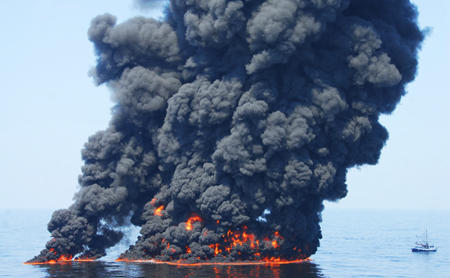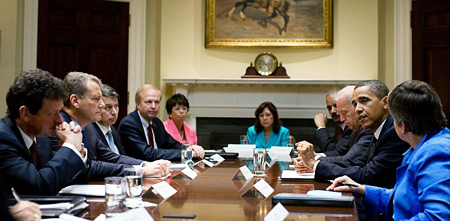Posted July 3, 2010
President Obama and the Congressional Democrats have been stern in their condemnations of BP. Yet their responses to the greatest environmental catastrophe in U.S. history show the Democratic Party’s unwillingness to challenge not only the logic of private profitability, but also the short-term prerogatives of corporate interests.

The President’s June 15 Oval Office address met a wide array of critics. Some questioned his lack of specificity, others the tardiness of his response. But Obama is operating within a box of his own construction. Out of deference to private property and corporate power, he will not entertain discussion of seizing BP’s assets to guarantee that all those harmed are made whole and that the Gulf is cleaned. The $20 billion dollar fund Obama got BP to agree to will not likely come close to what will eventually be needed. The logic of his pro-corporate agenda reduces his options in dealing with even a rogue corporation.
Given the limits of what the Democrats are demanding there is little reason to believe BP will ever pay for the mess it has created. After all, the petroleum industry has a long history at home and abroad of despoiling environs and then leaving the scene of the crime. The 2010 BP spill has often been compared to the 1989 Exxon Valdez spill. It is worth noting that the Valdez spill – far smaller in scale than BP’s Gulf spill – left an entire community ruined. Fishermen permanently lost their livelihood. Many Alaskans hired for cleanup operations suffered devastating health effects. And most of the oil was never cleaned. It just sank to the sea floor. And Exxon’s lawyers litigated for two decades, managing to reduce the original $5 billion punitive damages award to $500 million. Exxon may have learned this strategy decades earlier when, in 1957, it spilled 60 million gallons of oil into the ground underneath Brooklyn, NY. For the past fifty years, it has successfully avoided criminal penalties, has contributed little toward cleanup, and neighborhood residents – along with New York’s Attorney General – are still in court trying to get Exxon to pay for an oil spill which continues to pollute the water table and the air.
Even within the confines of pro-corporate politics, the Democratic response has been particularly anemic. Before Judge Martin Feldman blocked it, President Obama’s offshore oil drilling moratorium was exceptionally narrow in scope. It would have impacted only 33 out of thousands of rigs. It would have affected no rigs currently in production. Nor has the president indicated that he will try to prevent BP from pursuing its “Liberty” project – an extraordinarily risky oil drilling project involving both vertical and horizontal drilling off the Alaska coast. BP has been given most of the clearances it needs despite its unusually poor safety record, and the fact that it authored its own environmental review, along with its own documents showing compliance with the Endangered Species Act.

Beyond BP: Democrats’ Environmental Policies Anemic at Best
During the 2008 campaign, Obama was happy to benefit from the sex and drug scandals that plagued the Minerals Management Service during the Bush years. MMS’s tawdry tabloid stories seemed to show the intertwinings of big oil and the Republican leadership. However, two years later it is evident that the Democratic president did little to transform MMS. A couple changes at the top but no plan to turn it into a regulatory agency that regulates.
President Obama has not even championed the modest proposal of his own Energy Secretary, Stephen Chu. Chu has testified and repeatedly written that merely painting flat roofs white and using light colored concrete in road construction would dramatically reduce global temperatures. Chu’s proposals do not threaten capitalism, yet the White House does not take them seriously. Even such minor regulations on the construction industry are too much for today’s Democrats.
On Capitol Hill, the Democrats have been no more impressive. Congressional Democrats have hauled oil executives before hearings and dressed them down for the entertainment of television audiences. Yet there is little indication that any action to prevent future spills, criminalize corporate misconduct, or end our addiction to oil will be forthcoming. U.S. Representative Ed Markey (D-MA) has proposed to use $50 million in federal subsidies to the oil industry to fund research into safer methods of oil drilling. This seems unlikely to reach the President’s desk, however, considering that Democratic Senators Kerry and Lieberman have just agreed to remove a provision from their climate bill that would have stripped the oil companies of $35 billion in tax breaks. Amazingly, there is no chorus of outrage in the Democratic caucuses of either house that petroleum corporations receive tax payer subsidies while schools, hospitals, and fire houses are cut.
Congressional Democrats are not proposing Canadian-style regulations to require oil drillers to first demonstrate the capacity to quickly construct relief wells before drilling off shore. Even Canada’s rules are not as strict as they could be: they don’t require that relief wells be drilled alongside the main wells. But they are not to the liking of the oil industry, which has lobbied Ottawa to soften them.
The only environmental reform under serious consideration is the “cap and trade” based climate bill that President Obama supports. Cap and trade shows the serious distortions that are inevitably created by those who insist upon embedding corporate profitability into any measure to fight global warming. Cap and trade rewards companies who emit less by allowing them to sell pollution “credits” to those who emit more. While higher levels of emissions may bring about “carbon taxes”, these taxes may prove more palatable than the costs of retooling for cleaner production. Thus cap and trade will benefit cleaner companies but its effectiveness in reducing total pollution levels is questionable. In a searing critique, British columnist George Monbiot demonstrated that cap and trade systems have even raised emission rates in China and India. He further documents how the Clinton administration, with then-Vice President Al Gore in the lead, torpedoed the most serious global efforts to address global warming during the Kyoto talks of the 1990s.
We need independent protest movements to demand that the government hold BP accountable for the Gulf disaster and take serious steps toward a green energy economy. A mass environmentalist movement can counter the power of legions of oil, coal, and chemical industry lobbyists. The Democrats will not lead such a movement, however. In fact, if recent history is a valid indicator, they won’t even be on our side.
